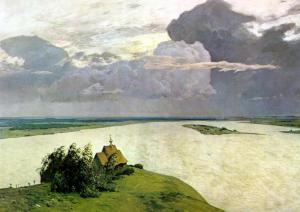NUKES. Medvedev and Obama signed the strategic arms treaty in Prague today. The text of the treaty is here. Such agreements are, no doubt, important but have little to do with the threats the two actually face.
MISSILE DEFENCE. On Tuesday Foreign Minister Lavrov said “The initial focus [of Washington’s current missile defence plans] is on regional systems, systems that do not prejudice strategic stability, and do not create risks for the Russian strategic nuclear forces.” Everything else is “when and if” Moscow thinks something else is happening (Moscow has appended to the Treaty a statement stressing that it only holds if Washington “refrains from developing its missile defence capabilities quantitatively or qualitatively”). Serving the ball to Washington, Medvedev said: “We offered to the United States that we help them establish a global anti-missile defence system, and we should think about this, given the vulnerability of our world, the terrorist challenges and the possibility of using nuclear arms by terrorists existing in this world”.
PRISONS. A measurement of the dreadful Russian prison system was offered by a Deputy Prosecutor General who said that 4150 people had died in correctional facilities and 521 in pre-trial detention centres in 2009. The last figure is especially appalling given that most of those should be out on bail. There are currently 861,867 people imprisoned across Russia. See below.
ECONOMIC CRIMES LAW. Yesterday Medvedev signed an amendment to the law on economic crimes. It does two things: it raises the level of economic value of the crime six-fold and sets bail levels. The object is to stop petty harassment of businesses and to encourage bail to replace pre-trial detention. As Medvedev said, when he promised to do something: “Corrupt officials get the word from an entrepreneur’s competitor, put the entrepreneur behind bars, and then let him out after he coughs up a certain sum.”
JIHADIST ATTACKS. No one was hurt by a bomb on a Dagestan railway line Sunday. But the next day a suicide bomber and a follow-up car bomb in Ingushetia killed and injured several people. Medvedev has ordered the creation of a “separate permanently active counterterrorism operations group” in the North Caucasus.
ECONOMY. Optimistic predictions from an American analyst on the “‘biggest bounce’ in the world” for Russia’s economy: 7% growth this year.
VISITS. A reason for the duumvirate, as we saw this week, is that the workload can be shared: Putin was in Venezuela 2-4 April and is now in Novosibirsk and on 6-7 Medvedev visited Slovakia and is now in Prague.
STALIN. Despite much disapproval (and from the Kremlin too) Mayor Luzhkov insists that Stalin’s visage will appear among posters of war leaders in Moscow’s Victory Day decorations. I wonder how this will turn out: an immoveable object meets an irresistible force.
INTERNET. A VTsIOM poll finds 38% of respondents use the Internet “several times a month” and 23% daily.
KATYN. Yesterday Putin and Polish PM Tusk took part in a ceremony commemorating the massacre of Polish prisoners at Katyn. Putin pointed out that the Russian people could not be held responsible. This is true: and neither should the Georgian people be held responsible; even though the idea was a Mingrelian’s, approved by a Georgian and carried out by the Georgian-dominated NKVD. The truth is that the Bolsheviks did it.
SOUTH OSSETIA. Moscow and Tskhinvali have signed an agreement on Russian basing in South Ossetia. The base will be in Tskhinvali and hold up to a large battle group. A similar agreement was concluded with Sukhumi in February. There will be no more Georgian military adventures into these areas.
KYRGYZ REPUBLIC. The opposition says it has taken control, claiming control of the security forces, and formed a provisional government headed by Roza Otunbayeva. President Bakiyev has fled to the south. Protests began in Talas on Tuesday and spread to Bishkek with some violence. Several discussions argue that the overthrow is rooted in big increases in utility costs with the profits going to Bakiyev’s favourites. Some reports speculate on the possibility of civil war (north vs south) but former President Akayev thinks Bakiyev does not have the necessary support. Moscow has reinforced its base at Kant and, it appears, is close to recognising the new government. Washington has a major stake in Manas. Nonetheless, it appears to me that the overthrow is sui generis and has nothing to do with either Moscow or Washington.
© Patrick Armstrong Analysis, Ottawa, Canada (see http://www.russiaotherpointsofview.com/)
